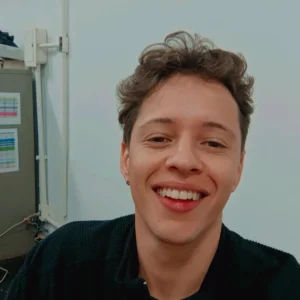
Igor Figueiredo
The Open University
Project
The strains of dating: Rb/Sr to the rescue?
Supervisors
- Dr Barbara Kunz
- Prof. Clare Warren
- Dr Tom Argles
- Prof. Craig Storey
- Dr Nick Roberts
PhD Summary
Understanding the timing of geological events is crucial for reconstructing the Earth’s crustal evolution. My PhD project focuses on advancing the in situ Rb-Sr dating method by refining its accuracy and integrating the resulting age data with petrographic and geochemical analysis. By studying mica minerals, I aim to establish a robust framework for confidently linking mica ages to geological processes, particularly within shear zones.
Previous activity
My academic journey has been centred around geology, with a particular focus on geochemistry and mass spectrometry techniques. During my bachelor’s and MSc degrees at the Federal University of Ouro Preto (Brazil), I developed software for trace elements and Sr-isotope data reduction obtained by LA-ICP-MS. This work supported my investigation of fluid sources for carbonate formation and diagenesis, where I applied the tools I created to address geochemical problems. Through these experiences, I gained substantial expertise in lab work involving LA-ICP-MS and geochemical analysis, providing the foundation for my current PhD project, which explores how geochemical signatures reflect geologic processes.
Why did you choose doctoral research?
Learning has always been something I have enjoyed and during my MSc, I found out how rewarding research can be. Pursuing doctoral research is an opportunity to enhance my current skills while preparing to become an independent researcher. I see it as the ultimate training to help me push the boundaries of knowledge and make meaningful contributions to society.
Why did you choose CENTA?
The training-based studentship offered by CENTA provides a fantastic opportunity to develop a diverse skill set. It allows me to gain expertise not only in my research are but also in broader professional skills, enhancing my career prospects and opening up a range of future opportunities.
Future plans
First, this research and training opportunity will provide me with advanced skills and expertise in diverse lab techniques and geochemistry approaches. Applying these will enable me to understand a wide range of geological scenarios and contribute to a deeper understanding of Earth’s dynamics. Secondly, the transferable knowledge I will be developing during this time will enhance my versatility as a professional, broadening my career opportunities and making me a highly employable professional. Looking ahead, I would love to stay in academia, doing research, expanding my knowledge, collaborating with other researchers, and teaching to pass this passion for science along.
